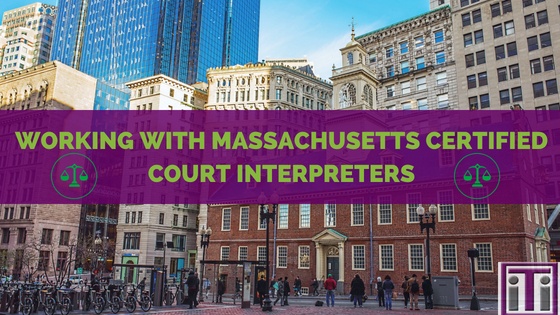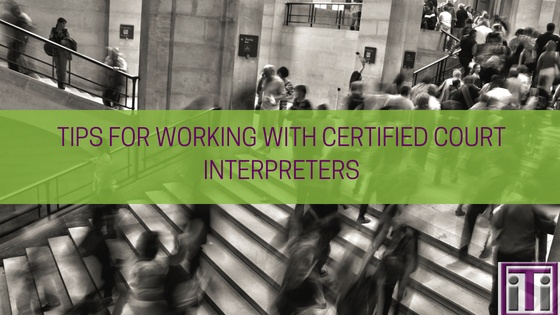If you’re an attorney or a paralegal in Massachusetts and have never or rarely used a certified court interpreter, you may appreciate some guidance on the role of certified court interpreters and how to best work with court interpreters.

Requesting a Court Interpreter
In Massachusetts, you may request a court interpreter by having the court complete a “Request for Interpreter” form. This includes any need for an ASL (American Sign Language) interpreter. The Court Liaison needs to sign the form each time you request a court-appointed interpreter. Every request is emailed to the Office of Court Interpreter Services (OCIS) at interpreter.requests@jud.state.ma.us.
Court May Require an Interpreter
In Massachusetts, the Designated Court Liaison or a court clerk (through MassCourts, the trial court case management system) may tell you that your client needs interpreter services. This system currently operates in most divisions of the District Court, Boston Municipal Court, the Superior Court, and Juvenile Court Departments. If yours is an emergency situation with no time to submit a written request, the Office of Court Interpreter Services (OCIS) may provide a court interpreter and the court will be responsible for compensating that court interpreter.
The Court Interpreter Code of Professional Conduct
In 13 pages, The Code of Professional Conduct for Court Interpreters of the Trial Court details what’s required from any Massachusetts court interpreter. The code explains that a court interpreter facilitates communication for all parties involved in a proceeding. The interpreter plays a vital role in the protection of the rights of LEP (Limited English Proficiency) and DHH (Deaf or Hard of hearing) individuals.
Complete and Accurate Interpretation Required
Court interpreters are officers of the court and their duty in a Massachusetts court proceeding is to serve the court and the public. Court interpreters are bound by law to provide a complete and accurate interpretation, sight translation, or written translation of all communications. They cannot alter, omit, or add to what the parties are communicating. Massachusetts court interpreters cannot explain or otherwise comment upon the communication. Their obligation to preserve accuracy includes the duty to correct any error of interpretation they discover during the proceeding.
Working with Court Interpreters

By following some best practices, a Massachusetts attorney or paralegal can work well with an interpreter over the phone or in person. It’s often best to start by briefing the court interpreter so he or she understands the basics of the case. When addressing a client who speaks limited or no English (often referred to as LEP—Limited English Proficient) attorneys and paralegals should speak directly to the client and not to the interpreter.
- You should speak in a natural tone of voice, not louder.
- Speak clearly at your normal pace and pause after every sentence or two.
- Ask your client only one question at a time.
- Stay away from legal terms, acronyms, and technical language.
- Be sure to ask the client if he or she understands and if more clarification is needed.
Attorneys and paralegals should also understand that some languages take more or less time than it takes to convey the same message in English. If you deliver a one sentence statement in English that doesn’t necessarily mean the best interpreter will translate your one sentence into a single sentence of similar length. When a court interpreter uses fewer or more words than you do it does not mean they are changing what you are saying.
How Court Interpreters Interact With Attorney’s Clients
In terms of explaining their role, court interpreters briefly explain to the LEP or DHH individual that they will translate any and all statements or comments. As required by the code of conduct, court interpreters advise the individual to not ask any direct questions of the court interpreter or initiate any independent dialogue with the court interpreter.
Communication is to be between the attorney or legal representative and the client. LEP or DHH individuals are not to ask the court interpreter for legal advice or explanations on any statement made during the proceedings. Every question must be directed to counsel or to the court. The court interpreter is also required to tell the individual to wait for the full interpretation of the English translation before they respond to a question.
3 Classification of Court Interpreters in Massachusetts
The Massachusetts Judicial Department defines legal interpreters in the following three ways:
Certified Interpreter
An interpreter certified by the Office of Court Interpreter Services, or one certified by the National Registry of Interpreters for the Deaf. Certification requires a passing grade on a written exam, compliance with a code of professional conduct, an observation in court, and an oral exam (for some languages).
Qualified Interpreter
A certified interpreter who has also passed the examination and is qualified to interpret in the federal courts by the United States District Court for the District of Massachusetts. The terms “professionally qualified interpreter” and “qualified interpreter” may also be used in common parlance to refer to court interpreters who have been trained and recognized by reputable interpreting national and international institutions.
Screened Interpreter
A court interpreter who has (1) met the minimum requirements for a court interpreter, (2) passed the screening and interview processes, (3) passed the screening examination, if given, (4) completed the mandatory training, and (5) completed the Mentoring Program.
iTi has been serving the Greater New England area including Massachusetts with reliable and professional court interpreters for both court and private litigation. Please contact us to schedule a court interpreter.






Comments are closed here.